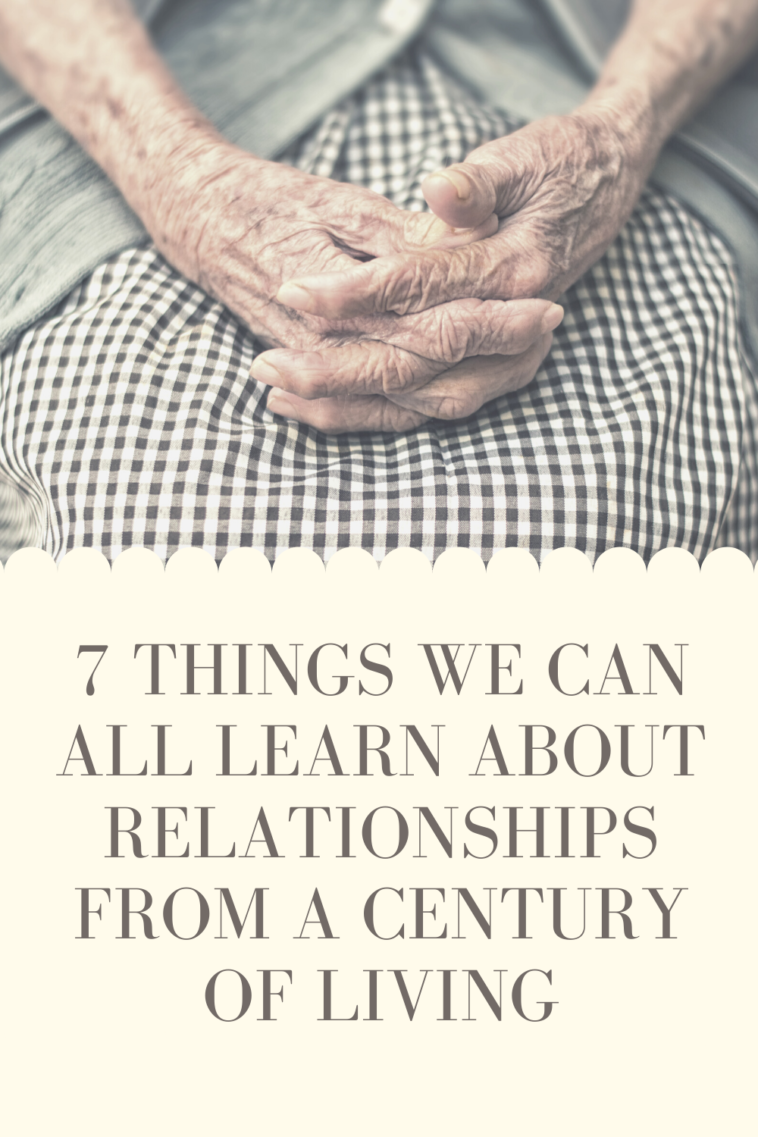h2>Dating : Seven things we can all learn about relationships from a century of living
When it comes to love, romance, dating and marriage, many of the issues women faced in the early 20th century have not changed today. Anne, who turned 100 last year, was married to Ron for 38 years before he died young in his sixties.
Anne met Ron during World War II at a munitions factory in London where they made speedometers for planes. While their marriage wasn’t one of picnics in the park and hand-holding down the street, many of its aspects are typical of relationships today. See if any of these resonate with your past or present relationships and what you can learn from them.
1. We want children more than we want a husband
Anne always wanted to have six children. She married Ron in 1943 and they had their first child 1944.
“I thought three boys and three girls or four boys and four girls would be nice,” Anne said. “He didn’t seem to mind the crowd.”
Anne said her happiest moments over the past 100 years were the births of her 13 healthy babies.
“I would rather have a miserable husband than sick children,” she said.
Unfortunately Anne got her wish. Ron didn’t do anything to help Anne raise their children. He spent his nights at the pub and weekends fishing.
2. We want someone responsible and ambitious
Ron had many qualities that Anne admired. He read many books, could quote Shakespeare and was a talented pianist.
“I used to sit and knit while he played,” Anne said.
But it wasn’t enough. Ron was lazy, irresponsible and had no ambition. He sometimes forgot to pay the bills. This was a stark contrast to Anne who worked hard and always looked for opportunities to get ahead in life. Ron was also an alcoholic and verbally abusive towards Anne who often felt like a “mother replacement” looking after the house and children.
“If you always make sure that his meals are on time and his clothes are alright, it’s a kind of love isn’t it?” Anne said.
“Love is a very peculiar thing. You can love someone without being in love with them.”
3. We get talked into marriage
Anne left the factory where she first met Ron and moved to the country to work for the Women’s Land Army. A friend of hers gave Ron her address so they started writing letters. When Anne came back to London six months later, Ron asked her to marry him. She didn’t believe in marriage. In fact, she wanted to be a nun.
“I said to him ‘I think I’ll go home and think it over’,” she said.
After pressure from his mother for “leading him on” and pressure from her mother not to become a “dried-up old woman”, Anne decided to marry him.
4. We expect passion and romance
Anne said the romance died the day she got married. She calls it a fait accompli which means an accomplished fact.
“Before you are married, they want your company all the time,” Anne said. “Once you marry them, they know you are going to bed with them.”
According to Anne, Ron was never affectionate and they never once went to bed at the same time together but it didn’t bother her.
“I was so busy with the children and interested and amused with them that I didn’t worry that there was no romance,” Anne said.
5. We have no good role models for marriage
Anne’s grandfather was a successful wine merchant in Belgium and owned an enormous hotel. During World War I, the German army was closing in so her grandfather sent his wife and daughter to England while Anne’s father and uncle went to war. Instead of following his wife, Anne’s grandfather stayed in Belgium with his mistress and never saw his wife again. Anne’s own parents and inlaws were also not good role models for marriage. Ron’s mother and father never spoke to each other. Anne’s mother and father spoke to each other but didn’t get along.
6. We settle when we don’t have to
Before Anne married Ron, she was engaged to another man.
“I really enjoyed his company,” Anne said. “We took walks in the park in the snow and went dancing.”
While passion existed, there was a slight problem.
“He only wanted three children and I didn’t want to give up my freedom for three children,” Anne said. “I wanted six. I wasn’t excited about getting married to Ron but I felt it was a natural thing to do.”
Anne said she didn’t have high expectations for marriage anyway.
“You say for better or worse, for richer or poorer until you die,” Anne said. “If I hadn’t got the children, I don’t think I could have stayed with him. When you realise it is for better or for worse, it gives you some expectations.”
7. We don’t know how good life can be after the marriage is over
When Ron died in 1981, Anne’s daughter said her mother was “like a butterfly that had emerged from a pupa”. Her children got to see the real Anne for the first time. Now having lived as a butterfly for almost 40 years, Anne is still doing the things she enjoys like reading and listening to current affairs. She has also become a semi-vegan in recent years. Whether Ron would approve or not doesn’t matter anymore. Spread your wings and fly butterfly fly.




